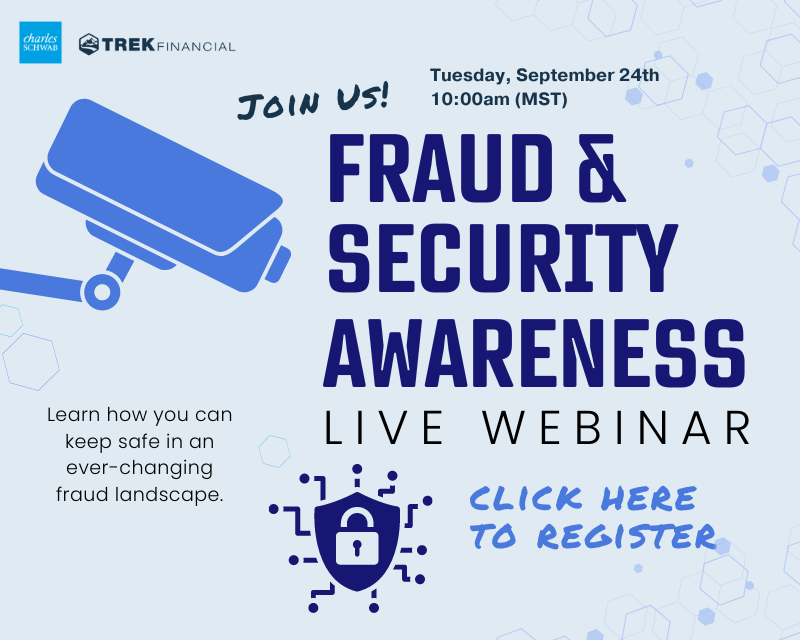
The Worst Mistakes Grandparents Could Make with Money
Article written by Geoff Williams, AARP
For many people, spoiling your grandchildren is one of the best things about being a grandparent. You remember your grandparents doing it to you, and now that you can, you want to pay it forward.
But giving cash, gifts or investments can be complicated, especially if you aren’t thinking about factors such as taxes or your grandkids’ financial maturity.
“Sometimes outright gifts, although they feel good, can have a lot of financial ramifications to all parties involved,” says George Raftopoulos, a certified financial planner and an adjunct finance lecturer at Bentley University in Waltham, Massachusetts.
The good news is there are steps grandparents can take to avoid the following five all-too-common financial mistakes.
1. Spoiling your grandkids at your own expense
Showering your grandchildren with expensive gifts may make you feel good, particularly when you see their eyes light up as they unwrap that toy drone under the Christmas tree. But financial pros warn against trying to give your grandkids the world if it stretches your finances thin.
“Grandparents should ensure they don’t put their own finances at risk by sharing resources that may be needed for their own living expenses,” says Mark Johnson, a teaching professor and fellow in investments and portfolio management at the Wake Forest University School of Business in Winston-Salem, North Carolina.
What you should do: Set a gift budget and stick to it. Rather than trying to spoil your grandchildren with big birthday and holiday presents — which only gets harder the more grandkids you have — scale back on the size of your gifts and be more intentional about what you give them. Consider presents that are creative yet inexpensive presents. For example, you could set up a holiday scavenger hunt, make them a scrapbook with mementos from times that you’ve spent together or teach them how to cook an old family recipe.
2. Failing to plan for your grandkids’ inheritance
If you wish to leave an inheritance to your grandchildren, a carefully crafted estate plan is a must. (Having one can also help prevent family disagreements over inheritance down the road.) But only about one in three Americans has prepared a will, according to a 2024 study from Caring.com.
What you should do: There are a number of things to consider when creating a will, especially if you have several grandchildren, says Liz Krebs, a certified financial planner in Chicago. For example, “if you have grandchildren who span a lot of different ages, you might want to think about how an older grandchild gets treated versus one who is much younger, she says.
If your grandchildren are around the same age and in similar financial shape, you could set up your will so that they each inherit equal shares of your estate, says Kristen M. Lynn, an estate planning attorney with Green & Sklarz, a law firm in New Haven, Connecticut.
However, if you have a grandkid with a disability, or one who is struggling financially and needs more support than the others, you could take that into account when determining your distributions, Lynn says. If you leave a larger inheritance to one grandchild, she suggests including a letter to your family in your estate plan that explains your decision, to mitigate any misunderstandings or hard feelings.
3. Setting up a 529 without discussing it with your kids
If you plan to open 529 college savings accounts for your grandchildren, communication with your children is key.
For one thing, your kids may already have a 529 fund set up for your grandchild, and they might prefer you contribute to it rather than opening a new account. Even if that’s not the case, it’s important to be open about your plans, Krebs says. “Grandparents will set up a 529 for their grandchild, but they don’t talk about how much they’ll contribute to their kids, and their kids will think the grandparent is funding the [whole] 529,” she says. She recalls a client who discovered that their college-bound teenager only had $15,000 saved in the 529 that the grandparents set up — not nothing, but far from enough to fund a college education.
What you should do: Talk to your kids to see if they have a preference for how they’d like you to contribute to your grandchild’s college fund. Be transparent about how often you plan to contribute, and how much. “In general, people don’t like having money conversations, but if you’re going to set up a 529 for your grandchildren, this is one you have to have,” Krebs says.
And be aware that any contributions you make to a 529 plan will be considered a gift from you to the beneficiary in the eyes of the IRS. Annual gifts up to $18,000 ($19,000 in 2025), are not subject to the gift tax, so you may want to limit your yearly contributions, Raftopoulos says.
4. Co-signing a student loan for your grandchild
Some grandparents may feel obligated to co-sign a student loan for a grandchild whose parents have poor credit and thus don’t qualify for a federal Parent PLUS Loan. Others may feel compelled to co-sign loan for grandchildren they are raising themselves.
No matter the rationale, this can be a risky move, says Jeffrey Wood, a certified financial planner and partner at Elysium Financial in South Jordan, Utah. If you default on a federal student loan, a portion of what you owe could be taken out of your Social Security benefits. A private lender can’t garnish your benefits but can take a co-signer to court if the student defaults on a loan.
“Student loans are not something to be trifled with,” Wood says.
What you should do: Find other ways to help your grandchild pay for college. Contributing to a 529 plan is certainly one option. You could also offer to help your grandchild apply for scholarships and grants or offer to pay some of their tuition directly to their college. Under a federal tax code exemption, tuition payments made directly to a college aren’t considered taxable gifts, no matter how large the payment, says Raftopoulos.
5. Not passing on your financial wisdom
You’ve got decades of financial experience and, hopefully, valuable financial wisdom. Passing it on to your grandchildren can help them learn good money habits and values. Unfortunately, some grandparents don’t take this step.
What you should do: Be open about how you’ve handled your finances over the years. That entails sharing not only your financial wins but also mistakes that taught you important money skills.
“Grandparents can do a lot to educate their grandkids by just sitting down and talking to them,” Wood says. “It can mean a huge difference between people who are financially educated versus somebody thrown into adulthood like the majority of people.”
5 Ways to Reduce Your Retirement Stress
Article written by Andrew Rosen, Forbes.com
Retirement is often imagined as a carefree phase of life, filled with relaxation, hobbies, and quality time with loved ones. But too often this isn’t the case.
Retirement is often imagined as a carefree phase of life, filled with relaxation, hobbies, and quality time with loved ones. But for many, the transition to retirement comes with its share of stress—uncertainty about finances, adjusting to a new routine, and navigating unexpected challenges. The good news? With the right strategies, you can minimize retirement-related stress and fully embrace this exciting chapter.
Here are five ways to reduce retirement stress and focus on what matters most.
1. Create a Clear Financial Plan
One of the leading causes of stress in retirement is uncertainty about finances. To ease these concerns, establish a comprehensive financial plan that includes:
- A budget: Outline your monthly expenses and track your spending to ensure you’re living within your means.
- Emergency fund: Maintain a cushion for unexpected expenses, like medical bills or home repairs.
- Withdrawal strategy: Work with a financial advisor to develop a sustainable plan for drawing income from your savings and investments.
When you know your finances are in order, it’s easier to enjoy retirement without constantly worrying about money.
2. Stay Physically Active
Regular physical activity is a proven stress reliever. Exercise releases endorphins, improves mood, and boosts overall health—all of which are crucial for reducing stress in retirement. Aim for a mix of activities that suit your lifestyle and abilities, such as:
- Walking or hiking
- Yoga or Pilates
- Swimming
- Strength training
Beyond the physical benefits, joining a fitness class or walking group can also help you build connections and stay socially engaged.
3. Maintain a Purpose and Routine
A sudden shift from a structured work schedule to unstructured free time can leave retirees feeling adrift. Combat this by establishing a sense of purpose and maintaining a routine. Consider:
- Pursuing hobbies or learning new skills
- Volunteering for causes you care about
- Taking part-time or freelance work if desired
- Scheduling daily activities, like morning walks or afternoon reading
A meaningful routine provides structure, gives you a reason to get up in the morning, and fosters a sense of accomplishment.
4. Strengthen Social Connections
Loneliness and isolation can significantly contribute to stress in retirement. Staying socially connected is vital for emotional well-being and overall happiness. Here’s how:
- Reconnect with old friends or make new ones through community events, clubs, or classes.
- Spend quality time with family, especially grandchildren.
- Use technology to stay in touch with loved ones who live far away.
Strong social bonds create a support network that helps reduce stress and brings joy to your daily life.
5. Focus on Your Health
Good health is a cornerstone of a stress-free retirement. In addition to staying physically active, prioritize other aspects of your health:
- Regular checkups: Stay on top of preventive care and address any health concerns early.
- Balanced diet: Eat nutritious meals to support energy levels and overall wellness.
- Mental health: Practice mindfulness, meditation, or relaxation techniques to keep anxiety in check.
Taking care of your physical and mental well-being can help you feel more in control and better equipped to handle life’s challenges.
Retirement doesn’t have to be stressful. By planning your finances, staying active, maintaining social connections, and focusing on your health, you can ease the transition and make the most of this rewarding phase of life.


a True 'Yellowstone’ Experience at This California Dude Ranch
Article written by Stacey Leasca, Travel and Leisure
“Yellowstone” aired its last episode ever on Dec. 15, though we’re sure there are plenty of spinoffs to come. But while you wait to see which characters or Dutton ancestors get their own series, why not take a trip to a real-life ranch that’s way easier to get to than rural Montana? And don’t worry — there are still cowboy vibes aplenty.
Tucked away in Northern California’s Lost Sierra region sits Greenhorn Ranch. The all-inclusive dude ranch is less than an hour and a half drive from Reno, Nevada, and has invited travelers to get in touch with their inner cowpoke for more than six decades. It’s the ideal, within-reach dupe for the Dutton homestead. Sprawling out over 608 picturesque acres, the property invites guests to explore the land by hiking, biking, or with a horse for the full effect.
“Greenhorn Ranch is a rare gem [that’s] still untouched by the bustle of modern life,” Peter Derbonne, the owner of the ranch, said to Travel + Leisure. “From our all-inclusive hospitality and diverse activities to the stunning natural beauty that surrounds us, Greenhorn Ranch provides the perfect balance of adventure and tranquility. It’s a place where families create traditions, friends become family, and every visit feels like coming home.”
:max_bytes(150000):strip_icc():format(webp)/TAL-header-exterior-greenhorn-ranch-california-GREENHORNRNHC0125-581eb8e7e05a461bacce19101a55c4c5.jpg)
Kyle Anthony/Courtesy of Greenhorn Ranch
Guests can have their pick of accommodations, which range from the property’s renovated rustic cabins, cozy lodge rooms, or a refurbished Airstream trailer. To start and end the day, visitors can dig into gourmet grub created by the ranch’s on-site chef, Brian Doyle; his dishes are meant to evoke the spirit of the West and involve plenty of prime cuts and fresh fish. After dinner, head to The Saloon for whiskey, cocktails, line dancing, and country music.
“At Greenhorn Ranch, we hope our guests leave with a deep sense of connection — connection to nature, to loved ones, and to themselves. Our goal is to provide a place where guests can unplug, unwind, and rediscover the simple joys of life,” Derbonne said. “Whether it’s the thrill of riding a horse across our sprawling acres, the serenity of casting a line in our fishing pond, or the camaraderie found around a campfire at The Saloon, we want every guest to take home cherished memories, a sense of adventure, and a renewed spirit.”
The ranch is open seasonally from May through October, so make your reservations and start rewatching all of “Yellowstone” now to prepare for your visit.
Digitize your old photos to preserve your history
Article written by Marc Saltzman, AARP
If you haven’t thought about bringing your old paper photos into the digital age, let the torrent of natural disasters in the past few years — wildfires, tornadoes, hurricanes, floods — motivate you to create copies of your family’s history.
You don’t have to give up the framed pictures, photo albums or shoeboxes of memories from before photography went digital in the early 21st century. But digitizing your still photos and home movies not only can help you regain some of what is lost after a tragedy, it also can help you:
- Search through your online photo library for people, places and things via a keyword or tag.
- Repair torn or faded photos and remove red eye with smart software.
- Share images with friends and family over email and social media.
- Create fridge magnets, photo galleries for your TV and other projects.
“Whether you digitize photos yourself or have a service do it for you, the key is to just do it — before it’s too late,” says Louise Smith, project manager at the University of Southern California (USC) Digital Library. “It’s one of those things we keep putting off.”
While USC is in the Los Angeles metro area, it isn’t near the wildfires, which destroyed at least 10,000 homes.
“It may seem daunting, especially if you have a lot of photos to digitize,” Smith says. “But it could be fun to make a weekend out of it, maybe with a friend or relative. If you’re not tech savvy or are too busy, finding a trusted digitization service is a good idea, too.”
Include not only your paper photos in this venture but also any negatives and slides you find.
Save money. Scan the photos yourself
To do your own digitizing, you can pick up a flatbed scanner for as little as $59 if you don’t already own one. A multifunction printer, usually a combination inkjet printer, photocopier and scanner, also can be used to scan photos.
Lots of photos? Consider convenience. A high-speed scanner can top $500 but gives you more options, such as holding three dozen photos in its feeder so you have less to do by hand. Think about this if you have hundreds or thousands of photos although you will want to compare costs and expertise with a service.
Other scanners for home use generally require scanning prints one by one. While wireless models are available, the process usually involves connecting the flatbed scanner to your computer via the included USB cable, lifting up the scanner lid to place a photo inside, face down, and pressing a button to digitize it.
The image will show up on your computer screen. Now you can rename the file into something searchable, including the date, people in the image, location or event.
One advantage of flatbed scanners. They have ability to handle larger formats. That makes easier work of preserving birth certificates, deeds, drawings, letters, marriage licenses, newspaper articles and images of sentimental keepsakes like grandma’s favorite broach.
Most flatbed scanners are letter size, 8.5 inches by 11 inches, or legal size 8.5 inches by 14 inches. However, large-format scanners can handle documents of 11 inches by 17 inches or more.
Smartphones aren’t for archiving. Smartphones have the capability of scanning photos and are convenient for some purposes.
But the color and quality of your original picture won’t be preserved in a smartphone scan, and you may get glare from a flash. You might also need to crop or rotate the image when it’s done, which takes time.
Choose higher resolution, larger file size for posterity
You’ll want to scan your photos at a high resolution to capture a high level of detail for future use. The higher the dots per inch (dpi), the sharper the image.
Pick both local storage and the cloud
Where to save your newly digitized photos? Your first option is an external hard drive, which has the potential for more capacity than the largest flash or thumb drives and is tougher to misplace. The second is the cloud, offsite storage on a company’s computers.
Hedge your bets.
Yes, a hard drive is a one-time purchase and doesn’t need an internet connection to access. And chances are good you’ll need to pay a monthly subscription to secure all the space you’ll need to store your memories in the cloud.
But if you’re not home to grab your hard drive in an evacuation or you get little to no warning, which can be the case in a flash flood, house fire or tornado, your external drive could be destroyed like your paper photos. Even storing a hard drive in a bank’s safe deposit box can make it vulnerable in a disaster.
A service you pay for potentially could go bankrupt, decide to shut down or face a data breach. But that’s less likely with longstanding national companies, and your files will be backed up regularly.
Look for deals in the cloud that bundle other services
Some cloud options available nationwide offer more than storage:
- Amazon Prime, $139 a year, includes unlimited “full resolution” photo storage and 5 gigabytes (GB) for video storage. Prime Video, Amazon Music for Prime and free shipping are among dozens of other benefits.
- Apple One, starting at $19.95 a month, includes 50GB storage that up to five family members can share along with Apple TV+, Apple Music and Apple Arcade games. iCloud+ 50GB storage is 99 cents a month. Get 5GB free.
- Dropbox Plus, starting at $119.88 a year, includes 2 terabytes (TB) storage, the ability to restore deleted files for 30 days and PDF annotating, editing and signing. Get 2GB free.
- Google One, starting at $16.99 for first year and $19.99 after, for 100 GB combined storage for Google Drive, Google Photos and Gmail and the ability to share the storage with up to five others. Get 15GB free.
- Microsoft 365 Business Basic subscription, starting at $72 a year per user, includes 1 terabyte (TB) of cloud storage — about 1,000 GB — and more than 10 apps including Excel spreadsheets, Outlook email, PowerPoint presentations, Teams communication and Word documents. A Microsoft 365 Family plan, $129.99 annually, is for one to six people and offers up to 1TB per user with fewer apps. Get 5GB free.
Save time. Pay a service to scan
If you have too many photos, are too busy, or don’t have enough confidence in your ability to digitize the photos on your own, check out local or national services that can do the work for you. Online companies such as Fotobridge, Legacybox and ScanMyPhotos will give you an estimate and deliver boxes and packing materials with instructions so your analog media is preserved in transit.
Costco, CVS, Sam’s Club and Walmart offer their digitization services through Capture.com. Many Walgreens allow you to use their in-store photo kiosk to start your order and drop off your paper photos, negatives and slides in the photo department; iMemories does the processing.

According to SHRM, a 2021 Employee Benefits Survey conducted by XPertHR showed that roughly 82% of employers studied matched a portion of their employees’ contributions while the remaining 18% didn’t provide any matches at all.
Source: shrm.org, 2021
Entertainment & Education
Looking for something to read?
This list consists of the top 7 retirement books of 2024.
Source: Morningstar.com
On the Bright Side
Updated Retirement INsights Disclosure: This document is for informational purposes only. All information is assumed to be correct but the accuracy has not been confirmed and therefore is not guaranteed to be correct. Information is obtained from third party sources that may or may not be verified. The information presented should not be used in making any investment decisions. It is not a recommendation to buy, sell, implement, or change any securities or investment strategy, function, or process. Any financial and/or investment decision should be made only after considerable research, consideration, and involvement with an experienced professional engaged for the specific purpose. All comments and discussion presented are purely based on opinion and assumptions, not fact. These assumptions may or may not be correct based on foreseen and unforeseen events. Past performance is not an indication of future performance. Any financial and/or investment decision may incur losses.
Investment Advisory Services offered through Trek Financial LLC, an investment adviser registered with the Securities Exchange Commission. Information presented is for educational purposes only. It should not be considered specific investment advice, does not take into consideration your specific situation, and does not intend to make an offer or solicitation for the sale or purchase of any securities or investment strategies. Investments involve risk and are not guaranteed, and past performance is no guarantee of future results. For specific tax advice on any strategy, consult with a qualified tax professional before implementing any strategy discussed herein.


